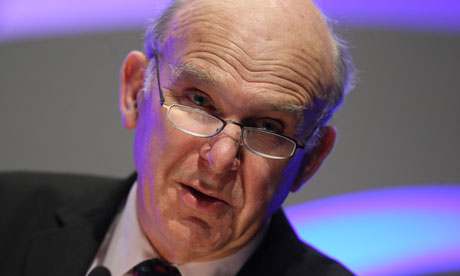
Banks' anti-business culture and 'obsession with short-term profits' is harming the economy, warns business secretary.

Vince Cable says the government is working hard to reform banks as it tries to split retail banking from 'casino' investment banks. Photograph: Sportsphoto/Allstar
Britain's banks are "throttling" the economic recovery because of an anti-business culture which focuses on short-term profits, the business secretary, Vince Cable, has said.
As Ed Balls warned of widespread outrage if the ousted Barclays chief executive, Bob Diamond, receives a £16m pay-off, Cable accused banks of undermining multibillion-pound measures to help businesses.
Speaking on The Andrew Marr Show on BBC1 on Sunday, the business secretary said: "The real problem at the moment is that the banks – because of their existing culture, which is frankly anti-business, obsession with short-term trading profits, not focusing on the long term – are throttling the recovery of British industry."
Cable's attack came as Ed Miliband announced a plan that would see Britain's five main high street banks broken up and forced to sell up to 1,000 branches. This would allow two new "challenger banks", run by the private sector, to offer more choice and lower charges. He used an interview with the Mail on Sunday to explain that he would like to introduce a regulatory body modelled on the British Medical Association, with a stringent code of conduct and an increase in the powers of the Serious Fruad Office.
Cable said the government was working hard to reform banks as it implements the Vickers recommendations to separate retail banking from "casino" investment banks. But the business secretary blamed banks for undermining the multibillion-pound quantitative-easing programme by the Bank of England to inject liquidity into the economy.
He said: "There has been a breakdown in the mechanism, in the transmission. It just doesn't get through to companies. We are going to ensure that the new money that the chancellor and the governor of the Bank of England talked about at the Mansion House does actually directly reach the companies.
"Given that our leading banks are, frankly, throttling recovery by not making business lending available, particularly to small-scale companies, we now have to focus single mindedly on that task. How to make sure that the additional money gets through to business."
The business secretary indicated impatience with some of his Conservative colleagues, who were wary of state intervention, as he praised the scheme by his predecessor, Lord Mandelson, to revive the car industry.
Highlighting the importance of working in collaboration with business, he said: "Laissez-faire just doesn't work. When you are making big long-term investments you have to have the government and the private sector working together. It has been a great success story in the car industry, similarly in aerospace and life sciences and others."
Cable showed a growing warmth between himself and Labour when he said, in a brief joint appearance with Balls on the sofa at the end of the Marr show, that he would like to co-operate with the party.
The shadow chancellor had earlier warned Diamond against accepting a £16m pay-off from Barclays. Balls said: "People will look at that and think that is totally outrageous. It is outrageous that somebody should stand aside because the board decides there is a problem and then get a payout which is off the scale for anything normal people will receive in their life times.
"The shareholders are going to think really hard about this. The government will need to look at this and talk to the shareholders. They clearly talked to the shareholders about Mr Diamond."
Balls also spoke of his anger after George Osborne used a Spectator interview last week to suggest he was involved in attempting to influence the Libor rate. Balls has denied this, though he says there was nothing wrong with raising questions about the Libor rate when the economy was in severe trouble.
The Mail on Sunday said Sir Jeremy Heywood, the cabinet secretary, was the senior Whitehall figure who raised concerns about the rate with Paul Tucker, the deputy governor of the Bank of England, at the height of the financial crash in 2008. This was designed to stabilise the economy at a fragile time.
A spokesman for Heywood told the paper: "We have no comment."
No comments:
Post a Comment